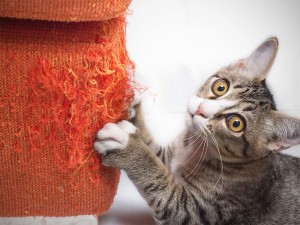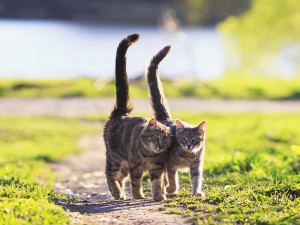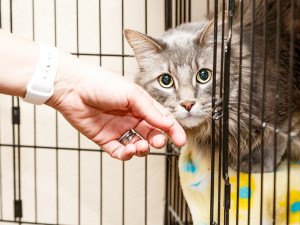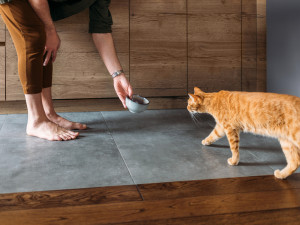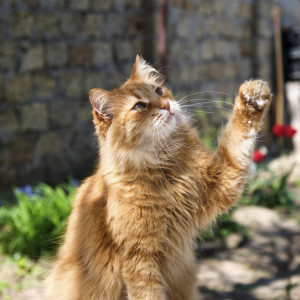Cat Hissing: Fair Warning or Fighting Words?
Your cat’s hissy fit could mean ‘Don’t test me’ or ‘Let’s do this’. It’s best not to call their bluff
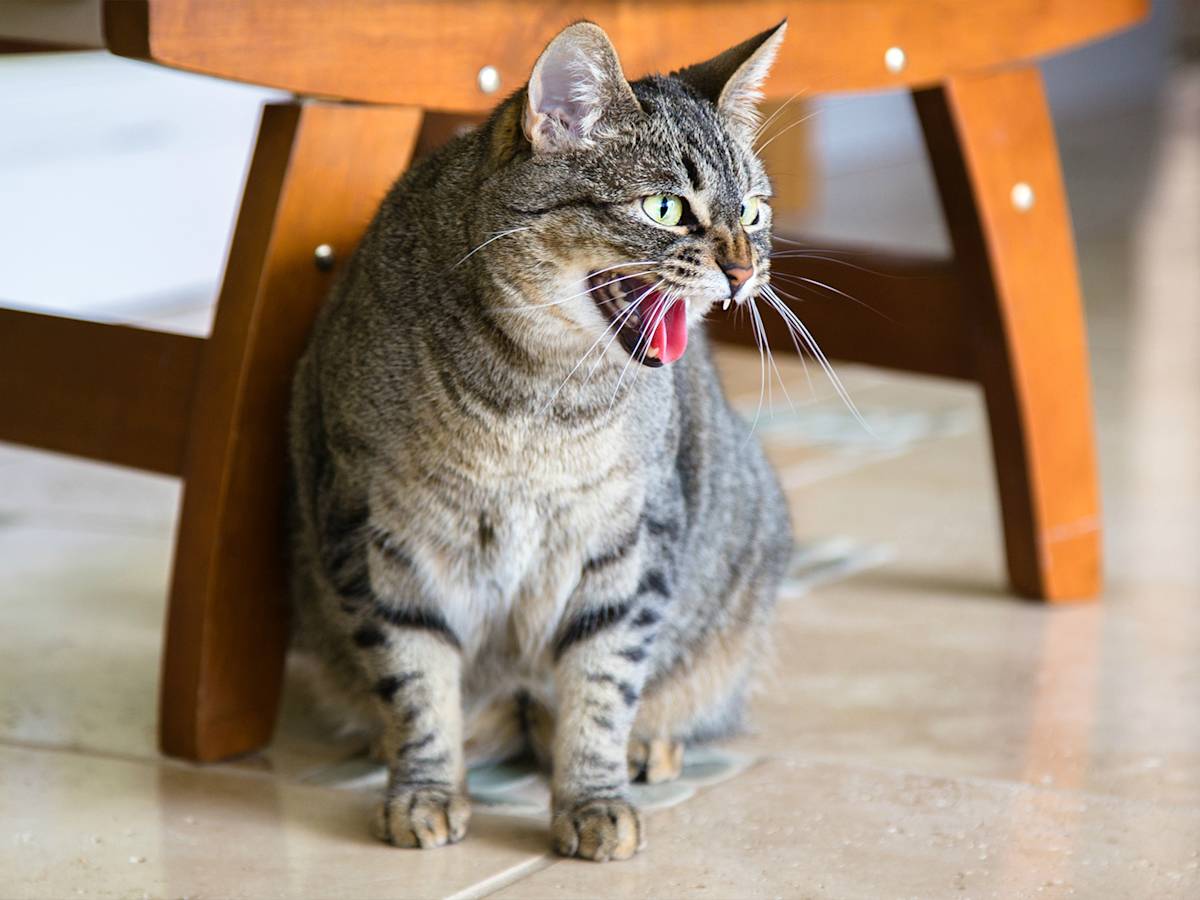
Share Article
Meows, purrs, trills, chatter… cats make a lot of weird noises. But we all know a hiss spells trouble. Or does it? In general, a hissing cat is an unhappy cat, just not always one that’s up in arms. We asked cat behaviourist Pam Johnson-Bennett to translate some of the most common hiss signals and what you can do about them, besides backing off.
I’m scared
Hissing can be a defence mechanism cats pull when they feel threatened in some way. “Whether a cat is afraid or annoyed, hissing indicates a feeling of being in danger,” explains Johnson-Bennett. “If feeling fearful, their body language may include looking around for an escape route. So make sure your cat has a safe avenue of escape or the option to hide.” If the threat is real, then the safest way to calm your cat is to lower the lights and visually block the trigger. “For example, if a cat is hissing at the sight of an unfamiliar cat outside the window, close the curtains and lower the lights so your cat doesn’t feel so exposed.” If the trigger is a permanent part of the household, Johnson-Bennett recommends consulting with a certified cat behaviourist. Just don’t try to pick up your cat when they’re in this reactive headspace because they could inadvertently redirect their aggression towards you.
I’m mad
Cat hissing can also be a sign that your pet is royally pissed off, whether at a physical sensation or another animal. An angry cat will have angry body language: pupils constricted, ears pulled back, tail puffed up and low. They will also hold their ground, says Johnson-Bennett, “warning the opponent or intruder that aggression could result if they don’t back off”. Most of the time, it’s just posturing and all they need is some space. House cats are much more likely to have a noisy debate than an actual altercation. Truly ornery cats can resort to chasing, swatting and even biting – so if your cat’s hiss is served with a side of spit, consider yourself warned.
This is mine
Although hissing is most often a defensive reaction, it can also be an offensive move to stake their claim. Male cats are more likely to hiss as a way of defending their domain – like tomcats hashing it out in an alley. But territorial hissing isn’t limited to outdoor cats. In multi-cat homes, hissy fits can erupt over a favourite perch. “An occasional hiss can happen between cat friends, but if it’s happening a lot and is accompanied by other behaviours, you need to examine the relationship,” says Johnson-Bennett. “The problem could be anything from your cats having been improperly introduced to a lack of personal space. There is a social structure among cats, but it’s centred around resources and safety. Some cat parents make the mistake of thinking they’re comfortable sharing their food, water and litter boxes, but that will set the stage for turf wars.”
Territorial behaviour is usually aimed at other cats, but sometimes it’s directed at dogs and people. “If your cat is hissing at a family member, ask that person to stop trying too hard to win them over because that can make your cat feel as if they have no control over the situation,” says Johnson-Bennett. “Instead, use gentle methods to help your cat feel more comfortable, like having that family member be the one who feeds and offers them treats. I also recommend using interactive playtime to help your cat associate positive experiences with the family member. This puts distance between the person and your cat so they can stay within their comfort zone. The key is to let your cat set the pace.”
I’m hurt
Sometimes, the threat is coming from within. If your cat hisses when you pick them up or when they move a certain way, they might be in pain: ailments like arthritis and dental disease can be painful enough to prompt hissing. There’s also the more obvious, immediate pain of a sudden injury. If you’ve ever accidentally stepped on your cat’s tail and suffered a swipe to the ankle, you know what we’re talking about. It goes without saying, if your cat is indeed hissing in pain, handle them with care – when they’re not feeling at their best, they might lash out and hurt you without meaning to. And of course, schedule a vet visit to find out what’s wrong.
I’m all worked up
Not every hiss is something to shrink from. It could be an expression of anxiety or overstimulation – similar to how parties can get you het up. If your kitten hisses at a toy while they bat it about the house, they’re not mad at it; they’re just delighting in the hunt and maybe also hyped up on catnip. Have you ever been stroking your cat and they seem to be into it, when suddenly they hiss and claw you, then run away? They may be over it or overexcited. Behaviourists call this ‘petting-induced aggression’ and believe it’s caused by repetitive contact.
In other words, your cat will allow you the privilege of stroking them, but only so much. Don’t take it personally; just pay attention to their body language and ease up on the affection when they show signs of feeling smothered. If it feels like your cat is emotionally unavailable to you, they could actually be anxious, in which case a pheromone spray or collar could help calm their nerves. Johnson-Bennett’s final word of advice? “Hissing means back off whatever it is you’re doing.”

Elizabeth Geier
Elisabeth Geier is a writer, teacher, and animal advocate with extensive pet handling experience and a soft spot for bully breeds and big orange tabbies.
Related articles
![A hand reaching towards a cat peaking out of a cage.]()
10 Questions to Ask a Rescue Centre About an Adoptable Cat
From medical history to adoption fees to litter preferences, here’s everything you need to know
![dark-haired woman hugging cat that has imprinted on her]()
10 Signs Your Cat Has Imprinted On You
Feeling like you have a little shadow these days? A cat behaviourist explains why that’s happening
![Profile view of a man giving a cat food to eat]()
Why Is My New Cat Not Eating?
A veterinary nutritionist explains the causes, signs and treatment for how to increase their appetite
Your Cat Is Limping. Now What?
When it’s no big deal and when you should worry

